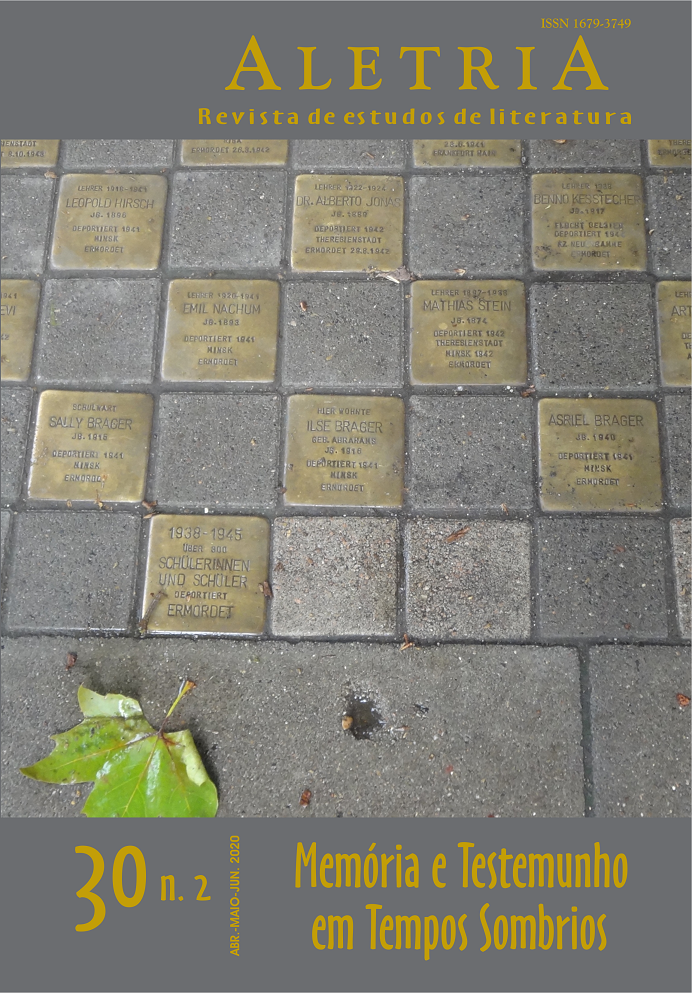A Poetic of the Incompleteness
Maria Tereza’s Literary Writing
DOI:
https://doi.org/10.35699/2317-2096.2020.21939Keywords:
memory, testimony, decolonial thinking, Negrices em flor, Maria TerezaAbstract
The article analyzes the text Negrices em flor, exploring how Maria Tereza’s poetic writing shows the invisibility, the silencing and the subordination of subjects produced in the colonial encounter and its violence. Focused on the black women’s double subordination, her writing concentrates not only on the black body, but mainly on the black female body. From this perspective, her writing is built as a testimony of a black memory and proposes the diaspora as a generating act of a black body. This black body, in opposition to the coloniality of power, asserts itself as a “critical frontier thinking” whereby the lyrical voice can redefine the ideas of citizenship, democracy, human rights and humanity, imposed by European modernity. As a critical frontier thinking, the black body can anchor the black subjectivity, especially the feminine subjectivity, in other cosmologies and other epistemologies.
Downloads
References
BENVENISTE, É. Problemas de Linguística Geral I. 4. ed. Tradução de Maria da Glória Novak e Maria Luiza Nery. São Paulo: Pontes, 1995.
BENVENISTE, É. Problemas de Linguística Geral II. 4. ed. Tradução de Eduardo Guimarães et al. São Paulo: Pontes, 1989.
BERNARDINO-COSTA, J.; GROSFOGUEL, R. Decolonialidade e perspectiva negra. Revista Sociedade e Estado, Brasília, v. 31, n. 1, p. 15-24, jan./abr. 2016. DOI: https://doi.org/10.1590/S0102-69922016000100002. Disponível em: http://www.scielo.br/pdf/se/v31n1/0102-6992-se-31-01-00015.pdf. Acesso em: 31 ago. 2018.
FANON, F. Pele negras, máscaras brancas. Tradução de Renato da Silveira. Salvador: EDUFBA, 2008. DOI: https://doi.org/10.7476/9788523212148.
FERREIRA, Aurélio Buarque de Holanda. Novo Dicionário Aurélio da Língua Portuguesa. 4. ed. Curitiba: Editora Positivo, 2009.
GINZBURG, J. Violência e Forma em Hegel e Adorno. In: SELIGMANN-SILVA, M.; GINZBURG, J.; HARDMAN, F. F. (org.). Escritas da violência: representações da violência na história e na cultura contemporâneas da América Latina. Rio de Janeiro: 7 Letras, 2012. p. 35-49.
GOMES, H. T. “Visíveis e invisíveis grades”: vozes de mulheres na escrita afro-descendente contemporânea. Portal Literafro, Belo Horizonte, 11 set. 2017. Disponível em: http://www.letras.ufmg.br/literafro/artigos/artigos-teorico-criticos/136-heloisa-toller-gomes-visiveis-e-invisiveis-grades-vozes-de-mulheres-na-escrita-afro-descendente-contemporanea. Acesso em: 26 set. 2018.
GROSFOGUEL, R. Para descolonizar os estudos de economia política e os estudos pós-coloniais: transmodernidade, pensamento de fronteira e colonialidade global. Revista Crítica de Ciências Sociais, Coimbra, n. 80, p. 115-147, mar. 2008. DOI: https://doi.org/10.4000/rccs.697. Disponível em: https://journals.openedition.org/rccs/pdf/697. Acesso em: 20 jul. 2018.
LEITE, I. B. Quilombos e quilombolas: cidadania ou folclorização? Horizontes Antropológicos, Porto Alegre, ano 5, n. 10, p. 123-149, maio 1999. DOI: https://doi.org/10.1590/S0104-71831999000100006. Disponível em: http://www.scielo.br/pdf/ha/v5n10/0104-7183-ha-5-10-0123.pdf. Acesso em: 01 ago. 2018.
MARIA Tereza Moreira de Jesus (1974-2010). A atriz negra que se lançou em alto-mar. Folha de São Paulo, São Paulo, 30 abr. 2010. Caderno Cotidiano. Disponível em: https://www1.folha.uol.com.br/fsp/cotidian/ff3004201025.htm. Acesso em: 25 set. 2017.
RANCIÈRE, J. A partilha do sensível. Tradução de Mônica Costa Netto. São Paulo: EXO experimental org: Editora 34, 2005.
SPIVAK, G. C. Pode o subalterno falar? Tradução de Sandra Regina Goulart Almeida. Belo Horizonte: Editora UFMG, 2010.
TEREZA, M. Negrices em flor. São Paulo: Edições Toró, 2007.
TEREZA, M. Ruídos. São Paulo: Editora Com-Arte, 2004.
TEREZA, M. Vermelho. São Paulo: Editora 34, 2009.
Downloads
Published
How to Cite
Issue
Section
License
Copyright (c) 2020 Terezinha Taborda Moreira (Autor)

This work is licensed under a Creative Commons Attribution 4.0 International License.
Authors who publish with this journal agree to the following terms:Authors retain copyright and grant the journal right of first publication with the work simultaneously licensed under a Creative Commons Attribution Non-Commercial No Derivatives License that allows others to share the work with an acknowledgement of the work's authorship and initial publication in this journal.Authors are able to enter into separate, additional contractual arrangements for the non-exclusive distribution of the journal's published version of the work (e.g., post it to an institutional repository or publish it in a book), with an acknowledgement of its initial publication in this journal.Authors are permitted and encouraged to post their work online (e.g., in institutional repositories or on their website) prior to and during the submission process, as it can lead to productive exchanges, as well as earlier and greater citation of published work (See The Effect of Open Access).





